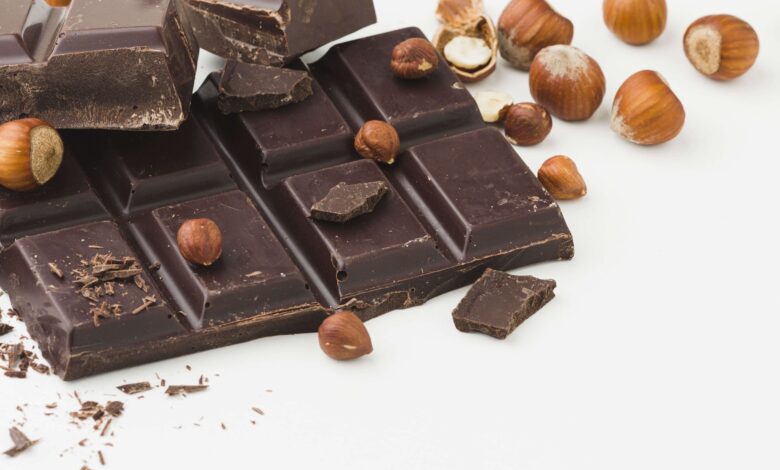Dark Chocolate: A Sweet and Healthy Indulgence

Dark chocolate is a delightful treat that has gained popularity for its rich taste and potential health benefits. Unlike its sweeter counterpart, milk chocolate, dark chocolate contains a higher percentage of cocoa solids, making it a favorite among chocolate enthusiasts and health-conscious individuals alike. In this article, we will explore the fascinating world of dark chocolate, from its origins and production process to its numerous health benefits and ways to incorporate it into a balanced diet.
What is Dark Chocolate?
Dark chocolate is a type of chocolate made from the roasted seeds of the cacao tree, scientifically known as Theobroma cacao. It is characterized by its high cocoa content and minimal added sugar. The percentage of cocoa solids in dark chocolate typically ranges from 70% to 99%, with higher percentages indicating a more intense and bitter flavor. Dark chocolate also contains cocoa butter, which gives it its smooth and velvety texture.
The Origin and History of Dark Chocolate
Dark chocolate traces its roots back to ancient civilizations in Mesoamerica, where the cacao tree was highly revered. The Mayans and Aztecs believed that cacao had divine properties and used it in various rituals and ceremonies. During the colonial era, dark chocolate was introduced to Europe, where it underwent further refinement and became a popular delicacy among the aristocracy. Over time, dark chocolate became more accessible to the general population, and its consumption spread across the globe.
The Production Process of Dark Chocolate
The production of dark chocolate involves several steps, starting with the harvesting and fermentation of cacao beans. Once fermented, the beans are dried, roasted, and ground into a paste called chocolate liquor. This liquor is then processed to separate cocoa solids from cocoa butter. The solids are further ground into cocoa powder, while the cocoa butter is mixed with additional ingredients, such as sugar and vanilla, to create the final dark chocolate product. The chocolate is then tempered, molded, and packaged for consumption.
Dark Chocolate vs. Milk Chocolate
Dark chocolate and milk chocolate differ not only in taste but also in composition. While dark chocolate has a higher cocoa content and lower sugar content, milk chocolate contains more milk solids and added sugar. The higher cocoa content in dark chocolate contributes to its distinct flavor and provides a more intense chocolate experience. Additionally, dark chocolate tends to have a more robust profile of health-promoting compounds, which we will explore in the following sections.
4 Health Benefits of Dark Chocolate
Dark chocolate offers several health benefits when consumed in moderation. Its nutritional profile includes essential minerals like iron, magnesium, and copper, as well as a variety of antioxidants. The following sections highlight some of the potential health benefits associated with dark chocolate consumption.
- Dark Chocolate and Heart Health
Research suggests that moderate consumption of dark chocolate may have a positive impact on heart health. Dark chocolate contains flavonoids, which are compounds that have been linked to lower blood pressure and improved blood flow. These effects, combined with the potential to reduce LDL cholesterol oxidation, may contribute to a reduced risk of heart disease.
- Dark Chocolate and Brain Function
The flavonoids found in dark chocolate may also benefit brain function. Studies have shown that these compounds can enhance cognitive performance and protect against age-related cognitive decline. The presence of stimulants like caffeine and theobromine in dark chocolate further contributes to increased alertness and mental clarity.
- Dark Chocolate and Mood Enhancement
Dark chocolate contains substances that can stimulate the production of endorphins and serotonin, which are neurotransmitters associated with feelings of happiness and well-being. Enjoying a piece of dark chocolate can provide a pleasurable experience and potentially improve mood.
- Dark Chocolate and Antioxidants
Antioxidants play a crucial role in protecting the body against oxidative stress and reducing the risk of chronic diseases. Dark chocolate is a rich source of antioxidants, particularly flavonoids, which can help neutralize harmful free radicals in the body and promote overall health.
How to Choose High-Quality Dark Chocolate
To reap the maximum benefits of dark chocolate, it’s essential to choose high-quality products. Here are some factors to consider when selecting dark chocolate:
Look for chocolate with a high percentage of cocoa solids (70% or more).
Check the ingredient list and avoid products with excessive added sugars or artificial additives.
Opt for organic and fair-trade options to support sustainable and ethical practices.
Consider the flavor profile and choose dark chocolate that suits your preferences.
Incorporating Dark Chocolate into Your Diet
Incorporating dark chocolate into a balanced diet can be an enjoyable and guilt-free experience. Here are some ideas for incorporating dark chocolate into your daily routine:
- Enjoy a small piece of dark chocolate as an after-dinner treat.
- Use grated dark chocolate as a topping for oatmeal, yogurt, or fruit salads.
- Add dark chocolate chips to homemade trail mix for a satisfying snack.
- Use melted dark chocolate as a dip for fresh berries or pretzels.
- Experiment with dark chocolate in baking recipes, such as cookies or brownies.
Moderation and Portion Control
While dark chocolate offers potential health benefits, it’s important to consume it in moderation. Due to its calorie and fat content, excessive consumption can lead to weight gain and other health issues. Stick to recommended portion sizes, which are typically around 1-2 ounces (30-60 grams) per day, depending on the individual’s calorie needs.
Dark Chocolate Recipes and Ideas
Here are a few delightful dark chocolate recipes and ideas to inspire your culinary adventures:
- Dark Chocolate Bark with Nuts and Dried Fruits: Melt dark chocolate, spread it on a baking sheet, and sprinkle with a mix of chopped nuts and dried fruits. Let it cool and break into pieces for a delectable snack.
- Dark Chocolate Avocado Mousse: Blend ripe avocados, cocoa powder, sweetener of your choice, and a splash of vanilla extract until smooth and creamy. Chill in the refrigerator for a velvety and indulgent dessert.
- Dark Chocolate Energy Balls: Combine dates, almonds, dark chocolate chips, and a hint of sea salt in a food processor. Roll the mixture into bite-sized balls and refrigerate for a quick and energizing snack.
Dark chocolate is not only a delightful indulgence but also a food with potential health benefits. Its high cocoa content, rich flavor, and nutritional profile make it a great addition to a balanced diet.
With its antioxidant properties, dark chocolate may contribute to heart health, brain function, and mood enhancement. Remember to choose high-quality dark chocolate, consume it in moderation, and explore various recipes to enjoy this sweet and healthy indulgence.
Frequently Asked Questions (FAQs)
Q: Can dark chocolate help lower blood pressure?
- A: Dark chocolate has been associated with modest reductions in blood pressure due to its flavonoid content. However, it should not replace prescribed medication or other lifestyle changes recommended by healthcare professionals.
Q: Is dark chocolate suitable for people with diabetes?
- A: Dark chocolate with a high percentage of cocoa (70% or more) and limited added sugars can be enjoyed in moderation by individuals with diabetes. It’s important to consider the overall carbohydrate content and incorporate it into a well-balanced meal plan.
Q: Does dark chocolate contain caffeine?
- A: Yes, dark chocolate contains a small amount of caffeine. The exact caffeine content varies depending on the brand and percentage of cocoa solids.
Q: Can dark chocolate help improve cognitive function?
- A: The flavonoids and stimulants present in dark chocolate, such as caffeine and theobromine, may have positive effects on cognitive function and alertness. However, further research is needed to establish a definitive link.
Q: How should dark chocolate be stored?
- A: Dark chocolate should be stored in a cool, dry place away from direct sunlight. It is best kept at a temperature between 60°F and 70°F (15°C and 21°C). Avoid storing it in the refrigerator as it can absorb odors and flavors from other foods.
Incorporating dark chocolate into your lifestyle can add a touch of indulgence while potentially offering some health benefits. Remember to savor it in moderation and explore the variety of ways you can enjoy the rich and satisfying flavors of dark chocolate.




